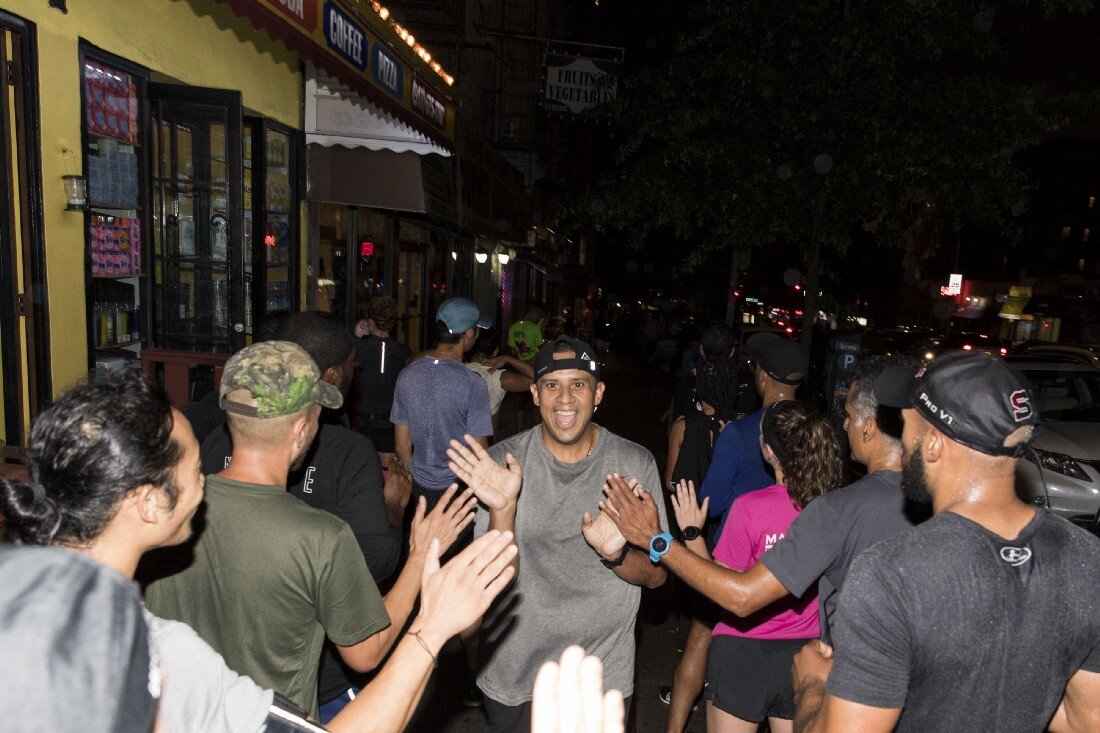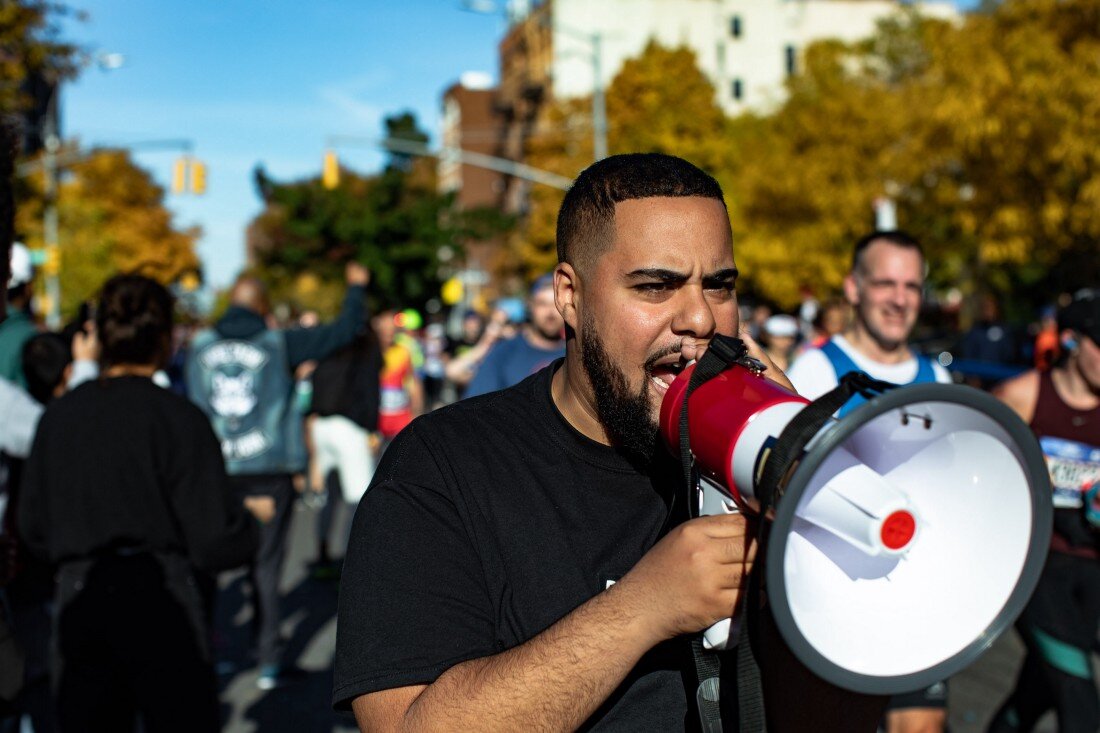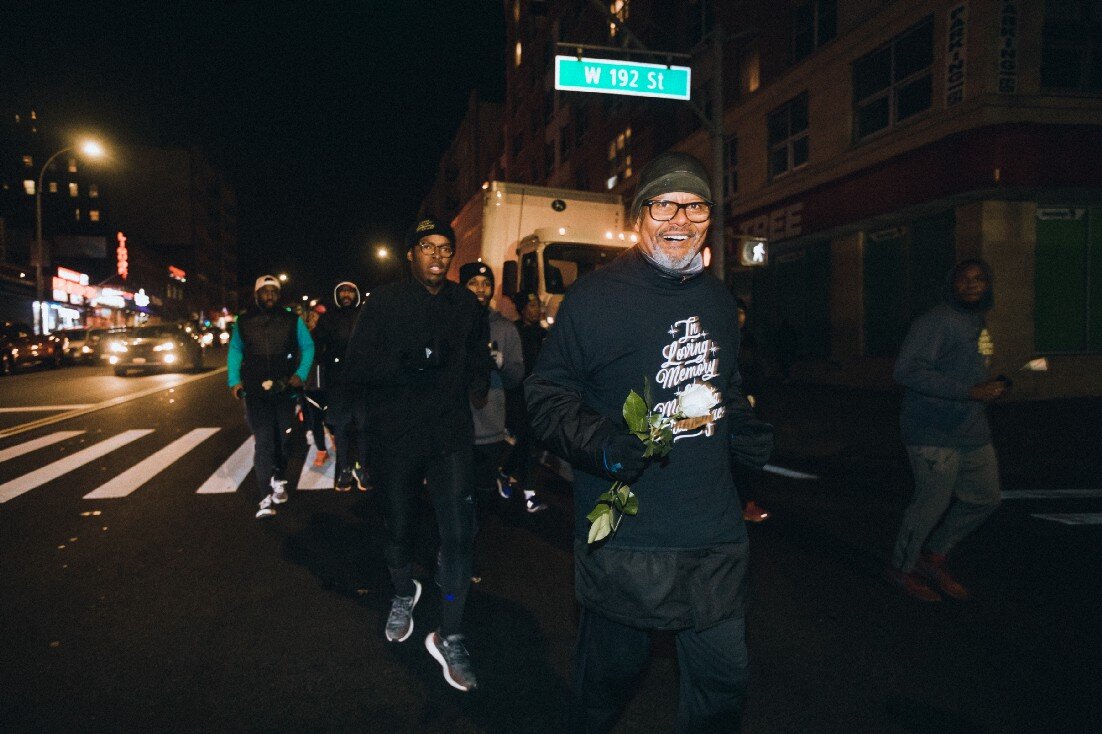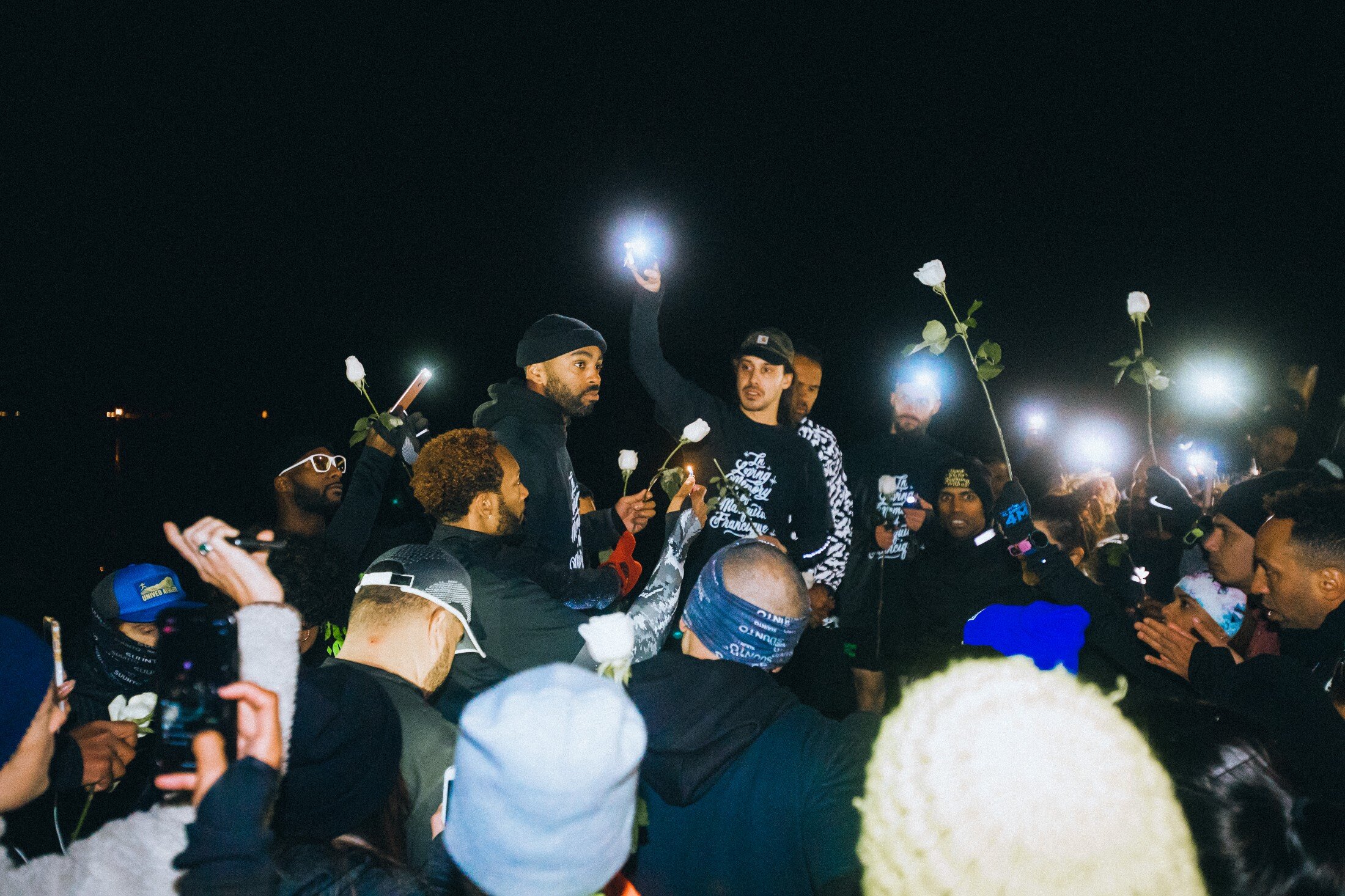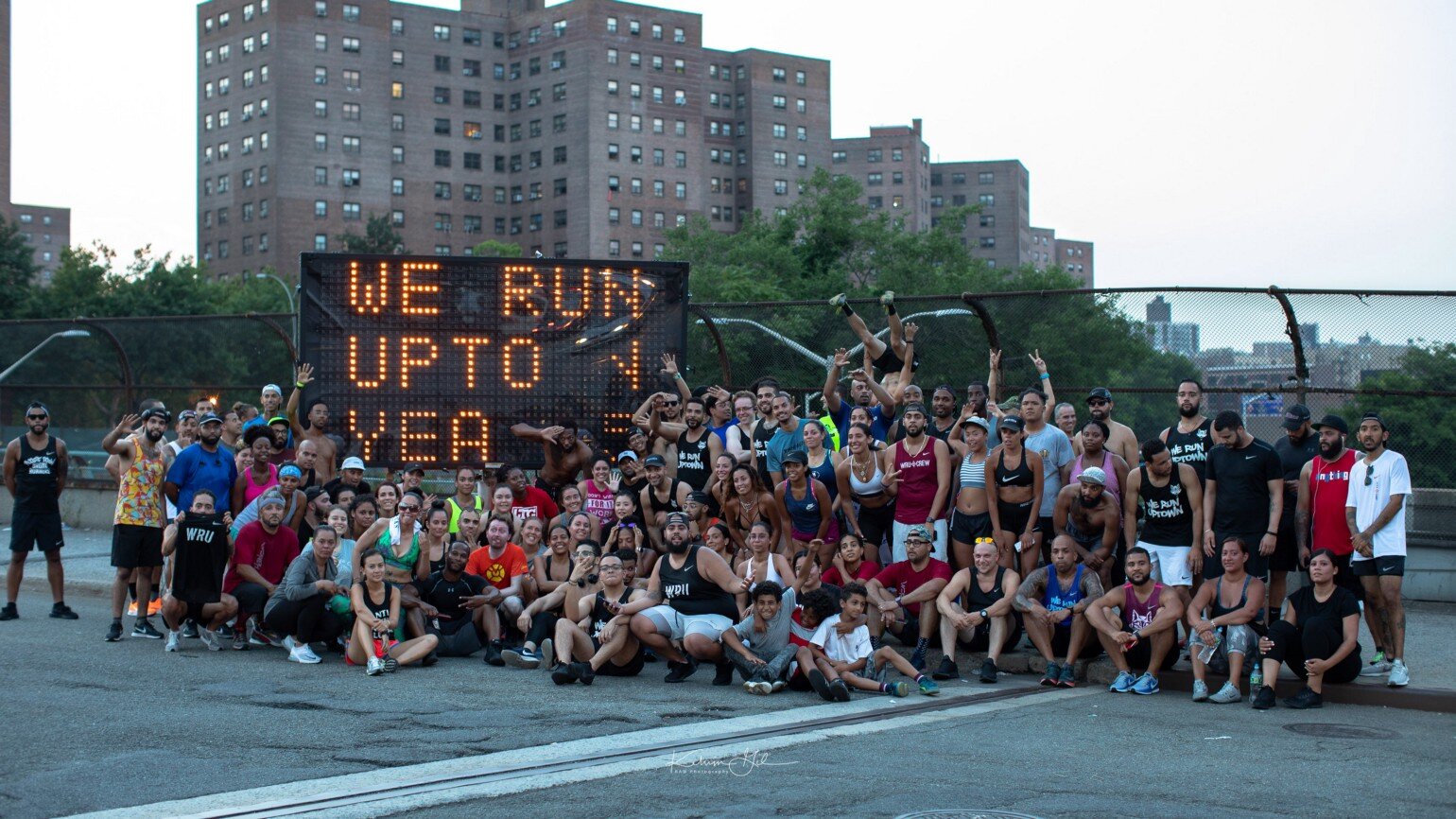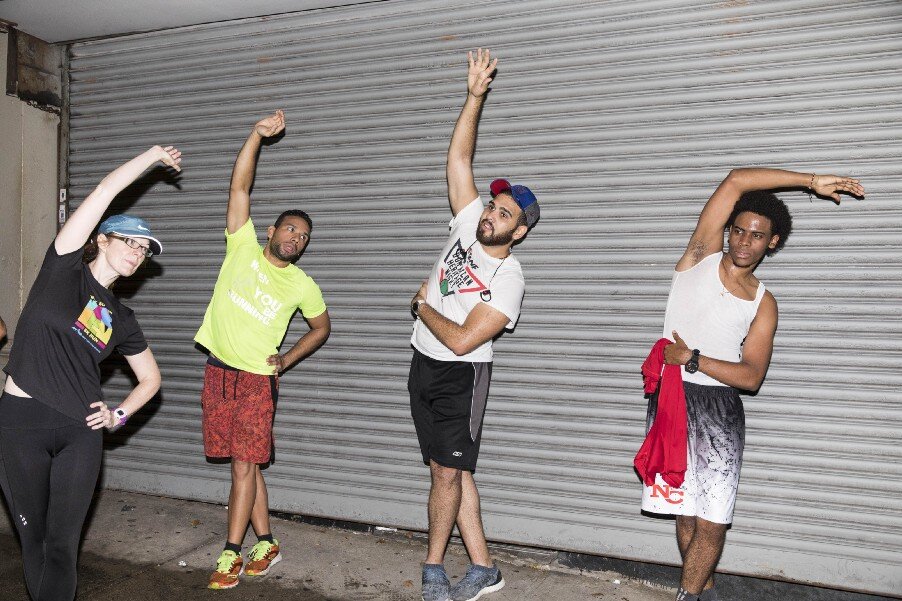How a community uptown comes together to run 🏃♂️Hector Espinal of WRU Crew
Listen on: Apple, Google, Spotify, Stitcher, TuneIn, Overcast, Pocketcast, RSS
TRANSCRIPT
Bailey Richardson: Take us back. When did you get into running?
Hector Espinal: I have never been athletic. I’ve never played any sports. I come from a Latino household so sports are very important in my house—basketball, baseball. All the men in my family are really into it but me, so always kind of been the black sheep. My dad would beg me to sit down and watch a baseball game, but I would always be like, “I’d rather go play video games,” or “I’d rather be surfing the web.”
I’ve always been on the heavier side. And I’m a big foodie. I like to eat, I like to try new foods.I have like a list of menus at home—you know I want to try this next time we go out. Then when I was in a relationship in my early twenties, I gained a lot of weight. We were going out to eat, there wasn’t much working out.
Hec on the run. Photograph by Kelvin Gil
Once the relationship was over, I saw how much weight I gained and it really, really bothered me. I got into this funk. I didn’t want to go out and I didn’t want people to see me. None of my clothes fit. I’ve been collecting streetwear since high school, so it was obvious. It got to a point that my biggest clothes didn’t fit me.
So that’s how I started running. I was just really, really sad, really depressed, and I started working out.
BR: What were those first runs like? Did they feel special?
HE: My sister took me on my first run. I still remember what I was wearing. They weren’t running sneakers. They were Nike training shoes, basketball shorts and a pro combat shirt.
After that, we would go for runs with some of her friends. It was cool, but it wasn’t really a thing.
When they all started college, those runs stopped. I remember my sister saying to me, “You have friends. If they’re your real friends, they’ll work out with you.” That was the seed of WRU Crew.
BR: So how did you get the first people to join you on these runs?
HE: Basically, I would guilt trip people. I would go on my phone and write, “Meet me at 168th and Broadway. We’re going for a run on the bridge.” Then I’d texting people, put it up on Facebook.
At first no one would come run with me. All my friends were smoking weed or partying. So I would just go on a tirade on social media. I guess eventually people just started feeling bad. I was pretty much asking for help—going on social media and publicly asking people to help me lose weight.
BR: That’s a pretty brave thing to do. What motivated you to be so vulnerable?
HE: There was no other way. I didn’t want to run alone and I knew for a fact that the couple times I went out by myself, I would run a couple of blocks and then just start walking. Sometimes I even turned back feeling like I don’t want to do this anymore.
But when you have a group of friends, it’s really, really hard to not do something. You have people that are holding you accountable. You have someone you can talk to and you have a support system.
I’ve always been very social and people. This is not me trying to brag, but I’m a fun person to be around so people would gravitate towards me, so I was like why can’t you guys come run with me? Let’s not go smoke, let’s not go drink. This is not going to party. Instead let’s go work out. And everyone’s was like, “Nah, we’re good bro. We’re not gonna do that.”
BR: If you couldn’t get your friends to run with you, who did show up?
HE: Women. None of my guy friends showed up, but I feel like women have sympathy. They were like, damn, this guy is like really on social media asking us to come work out with them. And it wasn’t until a big group of girls started coming out that the guy started to come out. I would always post pictures, whether there was one person or 10 people. When my guy friends saw all the women in the group, they started showing up.
BR: WRU Crew is a sight to behold. What was the response of people who saw you all running together?
HE: Running uptown wasn’t normal, especially social running. You’d only ever see a middle aged white person running on Riverside Drive, and those people weren’t even from the neighborhood. They were just on their long run on Riverside Drive. You never saw anyone on Broadway. Amsterdam or Washington Avenue. So when people started seeing us running together, it was very, very different from what they were used to.
BR: Josh Mock is your partner with WRU Crew. How did he come into the picture?
I met Josh through a mutual friend. When I first met him, he didn’t run at all. He played soccer, football, basketball, baseball and all that, but just no running. When he first started coming around, I saw like he spoke with conviction. He seemed very passionate about what we were doing uptown. And it seemed like he’d not only be beneficial to what I was trying to do, but that WRU Crew would also help him.
Josh worked at Nike Town at the time. So through Josh, we were able to tap into people who were athletic that worked at Nike but also lived uptown.
Today everything we do is like frick and frack, Yin and Yang. All our decisions are made together. No matter how big or small. We decide together on everything — is it beneficial for the group?
BR: How did you settle on Monday night runs?
HE: Josh and my schedules were conflicting. He worked retail, and I worked at the hospital. So we decided to pick a day — Monday, start the week off fresh. We also picked Monday was because Nike Training Club runs were on Mondays. So we would all that starting at 7:00PM, end at 8:30PM, and then we would try to recruit as many people who were coming uptown from MTC to come uptown to run with us.
BR: When did you start using the name “WRU Crew”?
HE: At that point, there was no Instagram or anything. We just used the hashtag
#werunuptown in all the pictures.
Then I meet Knox Robinson from the Black Roses, which is another running club in New York. I remember I was like, “What do you do for a living?” And he just said, “I’m a runner.” I had a blank look on my face. “You’re what?” He’s like, “Yeah, I’m a runner. I run.” I was like, yo, that’s crazy. We’re doing the same thing. I told him I had started this thing uptown, it’s called #werunuptown and we meet every Monday.
Knox told me he had been doing his run group for about 10 years at that point. That completely burst my bubble because I thought I had to start from scratch.
I went home and I was like, Yo, Josh, there is so much more going on. Uptown is a speck compared to the global run crew movement that’s going on.
So we attended all the other run crews in New York City to see what they were like—how they put on runs and how they branded themselves.
WRU Crew does the NYC Marathon. Photographs by Kelvin Gil
BR: What inspired the WRU Crew brand and image?
HE: Josh and I were always into graffiti. I suggested we abbreviate our name like a graffiti crew. We Run Uptown became WRU Crew. And we created an Instagram.
Our first logo was a scope inspired by Public Enemy. We were the young guys and it’s like we had like a target on our back. Everyone expected us to fail. Everyone I knew at first thought we were really annoying because we were from uptown and no one from uptown was running downtown and we brought a completely different attitude. We were obnoxious. We would go to run events and spray each other with Corona like it was champagne and we would stand on top of tables. We would do things that we would normally do uptown, but we were around a completely different demographic and everyone was older than us.
BR: A lot of the other crews you mentioned meet in southern Manhattan or Brooklyn. What does it mean to have WRU Crew in Washington Heights?
HE: What differentiates WRU Crew from all the other groups is that most of the people that come run with us are from the neighborhood. They’re not transplants. They’re not coming from Brooklyn or from Queens.
When we get 60, 70 people how to run, those are 60, 70 people who live north of Central Park. These are people who resonate with the neighborhood differently then run crews where everyone comes from all different parts of the city to run. This is their neighborhood, so they feel empowered. They know where we’re going. While we’re running, I’ve seen people bump into their moms or their aunts or their high school teacher because this is our neighborhood.
What we started uptown is for our neighborhood. We love when people from outside of uptown. We’re able to show them the sounds and the views. They get to hear that loud car blasting bachata or see the guys on the corner playing dominoes because that’s something that you might not see in Queens or the Upper West Side or Jersey.
BR: Why does it matter to you to have WRU Crew uptown?
HE: The youth is last uptown. It’s sad. It’s gotten to a point where you walk down the block now and these kids are like on the corner selling dime bags of weed. And the reason I say dime bags is because they’re not making any money. That frustrates me. These kids need outlets.
We want to be that resource. We want have some kind of impact on their lives.
When I was young we used to have the Police Athletic League, and even though I sucked at basketball I wanted to be there because all my other friends were there. You would bring two canned goods and $20 and in exchange you got a t shirt and an activity for the next 10 weeks. So for the next 10 weeks you were part of a basketball team and you went every Saturday morning at 8:00 AM for drills, breakfast and then games. Everyone got to play whether you were good or bad. It was just fun. We had something to be a part of. So we had all these programs that kept us busy after school. Granted, we eventually started like smoking weed—most people start smoking weed and in high school—but we were still on the right path. We would all want to go to school.
So we’re bringing something old and giving it a fresh, a fresh new look.
WRU Crew runs to remember Marquita Hannibal-Francique. Photographs by Keef Shoots
BR: WRU Crew has really evolved. It started with you looking for people to get healthy with, then it’s become a way to welcome other people uptown, and now you’re really thinking about what this means for the young people in the neighborhood.
Right. It’s insane because it started from a selfish place. It was just about me getting fit. I didn’t really care about like if someone else got fit. I was just going to gather people around me to get healthy and get out of this funk.
But over the last five years I’ve been able to help more people than I have in my 21 years prior to that. Over the last five years I’ve been able to see more of the world than I have in the 21 years prior to that. Over the last five years, I’ve been able to help my community more than I ever thought I would have been able to in the 21 years prior to that.
I’ve like a moment of self- realization where where you sit back and you’re like, shit, this is very important. I treat WRU Crew with so much respect. Until WRU Crew is the only thing that I do, I’m going to try to find as much free time as I can to dedicate to that because that’s what’s going to make a long lasting impact on my community.
BR: Why is that? Why does the youth matter and why does giving back matter so much to you now?
HE: I have two kids now. I have a three year old and a two year old. Little Hector and Hendrix are the most important thing to me.
It wasn’t until my kids were born where was like, “Yo, Josh, what the f*ck are we really doing for the community?” We were putting on these dope runs every Monday, we have this dope gear, but what are we really doing?
Josh and I just kept asking each other that question, and we were not really doing much. We created fitness uptown. We’ve brought running uptown and we have all these amazing people who meet up on Mondays. But there has to be a greater impact—a long lasting impact. What we want is 20 years from now we want Hector and Hendrix to come to a Monday night run. I know if I had this when I was 15 or 16, I would have stayed out of trouble.
The hard part of this is that we care a lot, but we also have to have jobs so we can pay our bills. So we’re doing as much as we can in our free time.
BR: One of the things that we see a lot with different communities is that people come at first for the activity, in WRU Crew’s case it’s running, but then they come back for the people.
It seems like that’s been true for you guys, right? You started for running, but in the long run, this is all about people.
My Mondays have replaced my Fridays. Monday is my social day.
After each run, we have a beer and a pizza together at Bodega Pizza. A lot of people see it as counterproductive. “Yo, you just ran and now you’re drinking beer while you eating pizza?” But it’s our opportunity to kick it and just be together.
We didn’t have a spot like that at first. We would just run in a park, then we would bounce because there’s nothing to do. No one wants to loiter in a park in New York City. It’s not fun. So us having access to beers and pizza and a bathroom and food is inviting. People want to stay.
I’ve had a drug dealer sit down with a surgeon and have a pizza and a beer. They won’t even know what each other does for a living because it wasn’t a topic of conversation. But you had two people from two opposite sides of the spectrum sit at the same table after a run and have a conversation. Josh and I will just laugh because these are two people that would never be talking to each other, and they’re here talking about current events. And that’s what the running community is. It brings people from all walks of life, from all ages together.
Every run ends with stretches, then pizza and beer. Photographs by Kelvin Gil
Get Together is produced by the team at People & Company.
We published a book and work with organizations like Nike, Porsche, Substack and Surfrider as strategy partners, bringing confidence to how they’re building communities.
Stay up to date on all things Get Together.





